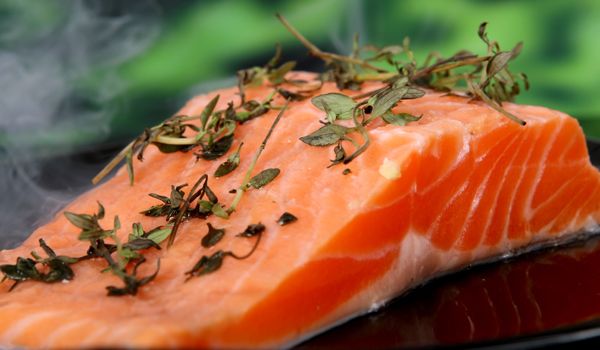Is Farmed Salmon Good for You?

Eating salmon and other oily fish has been recommended as a way of boosting omega-3 fatty acids, and potentially lowering the risk of heart disease. But now, some farmed salmon have lower levels of this healthful oil because of their diet, and it's not clear whether these less- nutritious fish are still as beneficial for people to eat.
In the wild, salmon eat a variety of small fish, but increasing demands for farmed salmon has meant exploiting those smaller fish populations. As a more sustainable solution, some farmed salmon are now being fed partly on vegetable oil.
"Some of the marine ingredients in salmon's diet are replaced with vegetable oil, and that will have some effects when it comes to nutritional composition of the salmon at the end,"said Trond Brattelid, a researcher at Norway's National Institute of Nutrition and Seafood Research.
In fact, vegetable oil constituted two-thirds of the total oil in the diet of Atlantic salmon produced in Norway in 2013, Brattelid said, adding that the proportion of vegetable oil in the diet of salmon farmed in other countries might be different. [8 Top Meals from Nutritionists]
In a new study, Brattelid and his colleagues set out to discover how consuming different kinds of salmon would affect mice that are genetically engineered to be prone to heart disease. The mice ate either salmon that had been fed on fish oil, or salmon that had had a diet consisting of 80 percent vegetable oil (from soy or rapeseed).The salmon accounted for half the dietary protein the mice consumed, and the rodents also ate a lot of sugar and fat.
In other words, the mice ate as if all their meals came from a fast-food restaurant that serves salmon, Brattelid told Live Science. This is not equivalent to a realistic daily diet for people, but was necessary to test the question the researchers wanted to answer, he said.
The results were mixed. As expected, mice that ate salmon fed on fish oil had a better balance of healthful omega-3 fatty acids to unhealthful omega-6 fatty acids, compared with mice that ate salmon fed on vegetable oil.
Sign up for the Live Science daily newsletter now
Get the world’s most fascinating discoveries delivered straight to your inbox.
However, eating salmon fed on vegetable oil didn't increase the animals' risk for heart disease. Moreover, to the surprise of researchers, mice that ate salmon that were fed vegetable oil even had less plaque buildup in their arteries than those that ate salmon that were fed fish oil, Brattelid said.
But that wasn't the end of the story.The researchers then looked at the animals' livers. The mice that ate the fish-oil-fed salmon had normal livers. But mice that ate vegetable-oil-fed salmon showed an accumulation of fat in their liver, a condition called nonalcoholic fatty liver.
The results suggested that perhaps the liver protects the animals and their cardiovascular system by accumulating fat when the ratio of omega-3 to omega-6 is low in their diet, Brattelid said. However, more research is needed to know whether this idea is correct, he said.
The findings, which were presented last week at the meeting of the American Heart Association in Chicago, raise new questions to be examined further in future studies, Brattelid said.
Still, including salmon and other oily fish in the diet is important, Brattelid said. Studies have shown that replacing fish oil with vegetable oil may reduce the omega-3 content of salmon by more than 50 percent, but that is still better than no omega-3s at all.
The American Heart Association recommends eating at least two servings of fatty fish each week. Other than salmon, fatty fish high in omega-3s include mackerel, herring, lake trout, sardines and albacore tuna.
Email Bahar Gholipour. Follow Live Science @livescience, Facebook & Google+. Originally published on Live Science.












